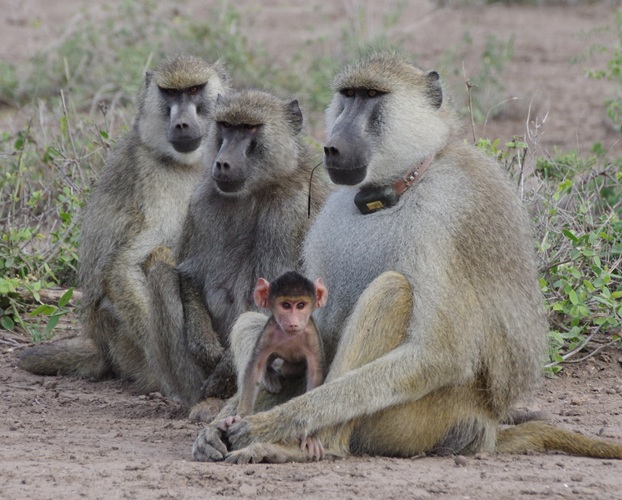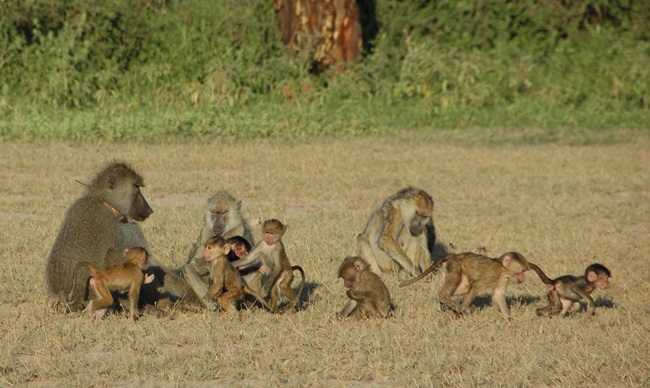Female baboons who have strong relationships with their fathers during their juvenile years lead longer adult lives than females who had weak paternal relationships. Professor Elizabeth Archie from the Department of Biological Sciences, University of Notre Dame tells us more about a new study that showed that, in baboons, even small paternal contributions to offspring care can have lifelong consequences for female baboons.

In humans, fathers provide substantial care and attention to their children with major benefits for child health and development. But in non-human mammals, caring fathers are rare. For example, in baboons, lions, gorillas, zebras, and several other mammals, males might live and socialize with their offspring, but the care they give is subtle and non-essential. We wondered: do these fathers’ modest contributions to offspring care affect their kids’ later-life outcomes?
We provide one answer using data from a 50+ year study of wild baboons in Amboseli, Kenya. We followed the lives of 216 juvenile female baboons who varied in how long they lived with their fathers: some fathers left the group before their daughter was born, while other father-daughter pairs lived together for several years. When young female baboons lived with their fathers, they sometimes had close relationships (i.e., they groomed each other often), while other pairs had distant relationships (they rarely or never groomed each other).

We found that how long a father lived with his juvenile daughter and how much they groomed each other predicted daughters’ survival in adulthood. When juvenile females had especially strong, early-life relationships with their fathers (i.e., they lived with them for many years and/or groomed with them), they lived 2 to 3 years longer in adulthood than females with weak or no relationship with their father. These effects were strong enough to counter-act some sources of early-life adversity that also affect females’ adult survival, such as surviving a drought or losing their mother early in life. So, if a female is lucky enough to have a caring father, this relationship could partially protect her from early-life adversity.
Both fathers and daughters seemed to make an effort to interact. Males were most likely to start a grooming bout in their daughter’s first year of life. But by the time the daughter reached one year of age, she was the one most likely to seek her father and initiate grooming. Males were most likely to make an effort to interact with their young daughters if they had evidence they were her father and if they had a little chance of siring another offspring while she was growing up.
Our results shed light on the evolution of paternal care in primates. Because longevity predicts female Darwinian fitness—females who live longer have more offspring—daughters and their fathers may experience natural selection to stay close and interact during daughters’ early lives.

What was your experience like publishing in Proceedings B?
We had terrific interactions with our editor and reviewers, who all contributed to improving the paper.
About the authors
David Jansen is a father of two boys. He was a Lab Manager at the University of Notre Dame when the analyses began and is now a Data Scientist at the Midwest Center of Excellence for Vector-Borne Disease. His work focuses on coding, data visualization, and exploring complex datasets to uncover insights that aren’t immediately obvious.
Kinyua Warutere is a Senior Observer at the Amboseli Baboon Research Project. He has studied baboons in Amboseli for nearly 30 years, and he collected many of the behavioral observations in this paper.
Jenny Tung is the Director of the Department of Primate Behavior and Evolution at the Max Planck Institute for Evolutionary Anthropology. She co-directs the Amboseli Baboon Research Project, together with Susan Alberts and Elizabeth Archie. Jenny studies how the social environment influences gene regulation, population genetic structure, health, and survival.
Susan Alberts is the Robert F. Durden Distinguished Professor of Biology at Duke University. She co-directs the Amboseli Baboon Research Project, together with Susan Alberts and Elizabeth Archie. Susan’s research focuses on the social behavior, demography, life history, and behavioral endocrinology of wild primates.
Elizabeth Archie is a Collegiate Professor in the Department of Biological Sciences at the University of Notre Dame. She co-directs the Amboseli Baboon Research Project, together with Susan Alberts and Jenny Tung. She is interested in the evolution of animal social behavior, including parent-offspring relationships.
Read the full paper Early-life paternal relationships predict adult female survival in wild baboons.
Proceedings B is looking to publish more high-quality research articles and reviews in animal behaviour. If you have an idea for a review, we strongly encourage you to submit a proposal by completing our proposal template and sending it to the journal. More information about the journal and the submission process can be found on our website.
Image credits:
Photo 1: An adult male and infant baboon in the Amboseli ecosystem, Kenya. Photo by Susan C. Alberts; Photo 2: An adult male and infant baboon in the Amboseli ecosystem, Kenya. Photo by Elizabeth Archie; Photo 3: An adult male and several juvenile baboons in the Amboseli ecosystem, Kenya. Photo by Susan C. Alberts.



